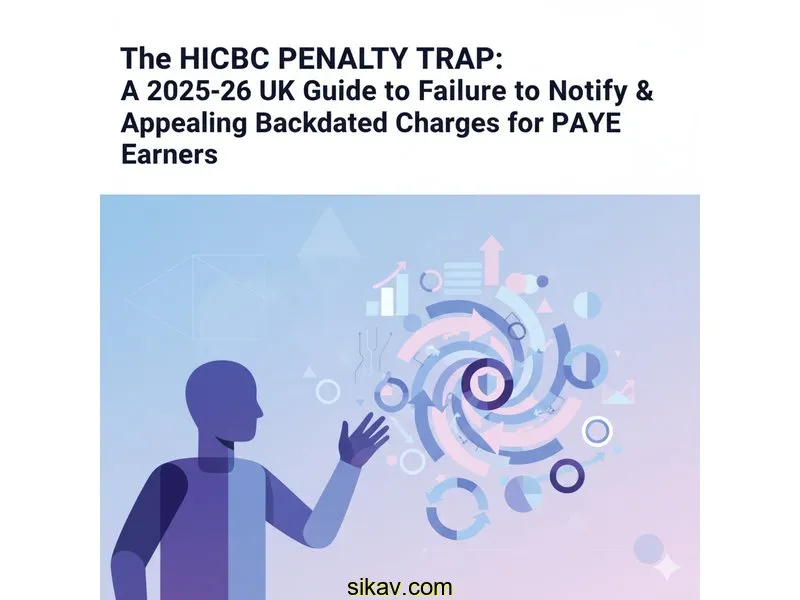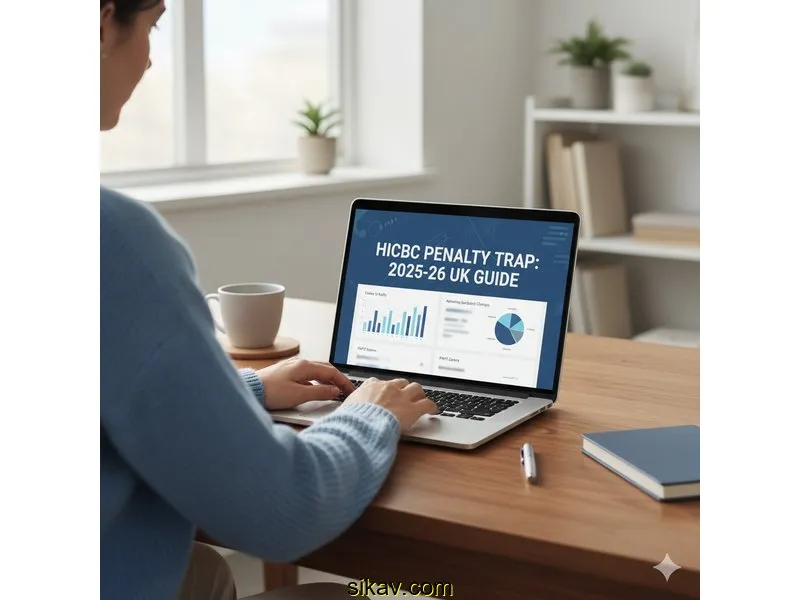
Picture this: you're a salaried employee, and your tax is handled neatly through PAYE. You've never needed to file a tax return. Then, a brown envelope from HMRC arrives. It states you owe £5,000. This isn't just for tax; it's for three years of backdated High Income Child Benefit Charge (HICBC), plus penalties and interest for 'Failure to Notify'. If this scenario sounds terrifying, it's because it's an all-too-common reality for thousands of UK parents.
This situation is known as the HICBC 'trap', and it has historically caught out parents who are standard PAYE employees, not business owners. The confusion is understandable: you claim Child Benefit (a welfare payment), but the repayment is triggered by your Self-Assessment tax return (a system you may have never used). This disconnect has led to countless families facing unexpected, life-altering bills. Let's explore why this happens, how to calculate the damage, and what you can do about it.
Key Takeaways
- New 2024-26 Thresholds: From 6 April 2024, the HICBC threshold (where the charge starts) was raised to £60,000, and the taper range (where the charge is fully repaid) was extended to £80,000.
- The Real 'Trap': The most severe penalties are not for claiming Child Benefit. They are for the 'Failure to Notify' HMRC (via a Self-Assessment tax return) that you were liable for the charge.
- Penalties are Significant: For a non-deliberate 'Failure to Notify', HMRC can charge a tax-geared penalty of up to 30% of the HICBC owed, in addition to late payment interest (HMRC, 2025).
- Appeal is Possible: While 'ignorance of the law' is not usually a valid excuse, a key tribunal case (*Wilkes v HMRC*) set a precedent that PAYE taxpayers with no other reason to file a return *could* have a 'reasonable excuse'.
- Disclaimer: This article provides informational guidance on HICBC and HMRC penalties as of November 2025. These are complex tax matters. This guide is not financial advice. You must consult a qualified tax accountant or professional adviser for your specific circumstances.
Why Does HICBC Trigger Self-Assessment? The PAYE Disconnect
This is the single most confusing part of the HICBC trap. Why doesn't HMRC just adjust your tax code? The answer lies in household income.
Your PAYE tax code is brilliant at one thing: calculating tax on *your* income. But HICBC is based on the 'adjusted net income' of the *highest-earning partner* in a household where Child Benefit is claimed. HMRC's PAYE system simply doesn't know if you have a partner, what their income is, or who claims the benefit. The only mechanism HMRC has to collect this information and the subsequent charge is the Self-Assessment tax return.
Think of it this way: your PAYE tax code is like a one-way street; it only sees *your* salary. But HICBC requires a 'roundabout'—it needs to look at both your income and your partner's to see who is the highest earner. Self-Assessment is HMRC's 'roundabout' for collecting this specific information. If your adjusted net income (or your partner's) exceeds the threshold, the higher-earning partner is legally required to register for Self-Assessment and declare the charge, even if they are 100% PAYE.
Calculating the Damage: How Backdated Charges and Penalties Add Up
When HMRC discovers a 'Failure to Notify', they can go back several years to reclaim the charges. For a non-deliberate error, they can typically assess tax for the previous 4 tax years. Let's look at a common scenario for a parent with two children who just received a letter in November 2025, covering the period before the new thresholds.
The table below breaks down the potential liability. Note how the old £50,000 threshold created a much harsher trap.
| Tax Year | Your Income | Child Benefit Received (2 Children) | HICBC Taper & Charge Owed | Potential 'Failure to Notify' Penalty (Max 30%) |
|---|---|---|---|---|
| 2021-22 | £62,000 | £1,885 | Income is over £60k. 100% charge. £1,885 Owed. | £565.50 |
| 2022-23 | £63,000 | £1,885 | Income is over £60k. 100% charge. £1,885 Owed. | £565.50 |
| 2023-24 | £65,000 | £2,074.80 | Income is over £60k. 100% charge. £2,074.80 Owed. | £622.44 |
| 2024-25 (New Rules) | £70,000 | £2,074.80 | Income is £10k over the new £60k threshold (halfway to £80k). 50% charge. £1,037.40 Owed. | £311.22 |
| Total Liability | - | £7,919.60 | Total Tax: £6,882.20 | Total Penalties: £2,064.66 |
As you can see, the bill is shocking. The total amount demanded could be **£8,946.86** (plus late payment interest), all because a PAYE employee was unaware of a complex tax rule. The new thresholds from April 2024 (Scenario 4) clearly reduce the burden, but the liability for prior years remains.
You've Received a Letter: A Step-by-Step Plan
Receiving an HMRC "discovery assessment" can be deeply stressful. Here’s a calm, logical approach to handling it.
The crucial thing to understand is that you must **separate the tax from the penalty**. The tax (the HICBC itself) is almost always owed. The penalties, however, are often appealable.
Step-by-Step: Tackling the HICBC Demand
1. Don't Ignore It: The problem will not go away; it will only get worse as interest and further penalties accrue. Read the letter carefully to understand the tax years and amounts involved.
2. Verify the Figures: Use your P60s or past payslips to confirm your 'adjusted net income' for the years in question. (Adjusted net income is your gross pay minus pension contributions and any Gift Aid donations). Check HMRC's HICBC calculation.
3. Register for Self-Assessment: If you haven't already, you must register for Self-Assessment immediately. You will need a UTR (Unique Taxpayer Reference) to file the returns.
4. File the Outstanding Returns: You will need to file a separate tax return for each year HMRC is assessing. This is how you formally declare the HICBC you owe.
5. Pay the Tax Owed: Arrange to pay the *tax* (the core HICBC amount) as soon as possible, even if you plan to appeal the penalties. This stops late payment interest from building up. You can contact HMRC for a 'Time to Pay' arrangement if you cannot pay in one lump sum.
6. Formally Appeal the Penalties: Once the returns are filed and the tax is dealt with, you can formally appeal the penalties for 'Failure to Notify'. You can do this using form SA370 or by writing to HMRC, clearly stating your grounds for appeal based on 'reasonable excuse'.
The Key to Appealing: What is a 'Reasonable Excuse'?

This is the most critical part of your defence. HMRC's own guidance states that "ignorance of the law" is not normally a reasonable excuse. However, the HICBC is a unique and complex beast.
Think of it like a parking ticket. Simply saying "I didn't see the 'no parking' sign" won't get you off. But if you can prove the sign was hidden behind a tree, you have a case. For HICBC, the 'hidden sign' is the fact the charge is buried in tax law, separate from the Child Benefit system, and not automatically handled by PAYE.
Crucially, the courts have sometimes agreed. In the landmark First-Tier Tribunal case **Wilkes v HMRC (2018)**, the judge ruled that the taxpayer—a PAYE employee with no other reason to file a tax return—*did* have a reasonable excuse for his ignorance of the HICBC rules. This case, and others like it, set a vital precedent. While it's not a guaranteed win, it shows that appeals based on genuine ignorance of this specific, complex rule *can* be successful.
Common Questions About HICBC Penalties
Based on questions I've seen across forums like r/UKPersonalFinance and Mumsnet, here are the most common points of confusion.
1. I'm PAYE, so why do I have to file a Self-Assessment tax return just for HICBC?
This is the heart of the trap. The PAYE system cannot handle HICBC because it doesn't know your partner's income or who claims the benefit. Self-Assessment is the *only* mechanism HMRC has for you to declare that you are the highest earner and are liable for the charge. The legal obligation to file falls on you, the taxpayer, not on HMRC or your employer to sort it out automatically.
2. HMRC is asking for 3-4 years of backdated HICBC. Can they really do this?
Yes. For an innocent 'Failure to Notify', HMRC's "discovery assessment" powers allow them to go back 4 tax years. If they believe the failure was 'careless', they can go back 6 years. If they suspect it was 'deliberate', they can go back 20 years. For most PAYE earners caught in the trap, it's treated as non-deliberate, and the 4-year look-back is standard.
3. What actually counts as a 'reasonable excuse' to appeal the penalty?
A 'reasonable excuse' is an event or circumstance that prevented you from meeting your tax obligation. Standard examples include the recent death of a close family member, a serious illness, or an unexpected system failure (e.g., HMRC's website was down). For HICBC, the argument—as used in the *Wilkes* case—is that as a PAYE taxpayer with no other complex affairs, you had no reason to believe you needed to file a tax return and that your ignorance of this specific, complex rule was, in itself, reasonable. This is not an easy argument, but it is a valid one to make in your appeal.
Conclusion: Your Next Steps
The increase of the HICBC thresholds to £60,000 (tapering to £80,000) from April 2024 will save many families from this trap in the future. However, it does not erase the liability for prior tax years. If you've received a letter, the key is to be methodical: verify the tax, file the late returns, and pay the tax bill to stop the interest.
From there, you can focus on appealing the penalties. Your appeal should be factual, polite, and clearly explain *why* you believe you have a reasonable excuse. Given the legal complexity and the specific case law involved, this is one area where investing in a few hours of a qualified tax accountant's time can be invaluable. They can help you frame your appeal in the strongest possible terms, turning a potential financial disaster into a manageable problem.

